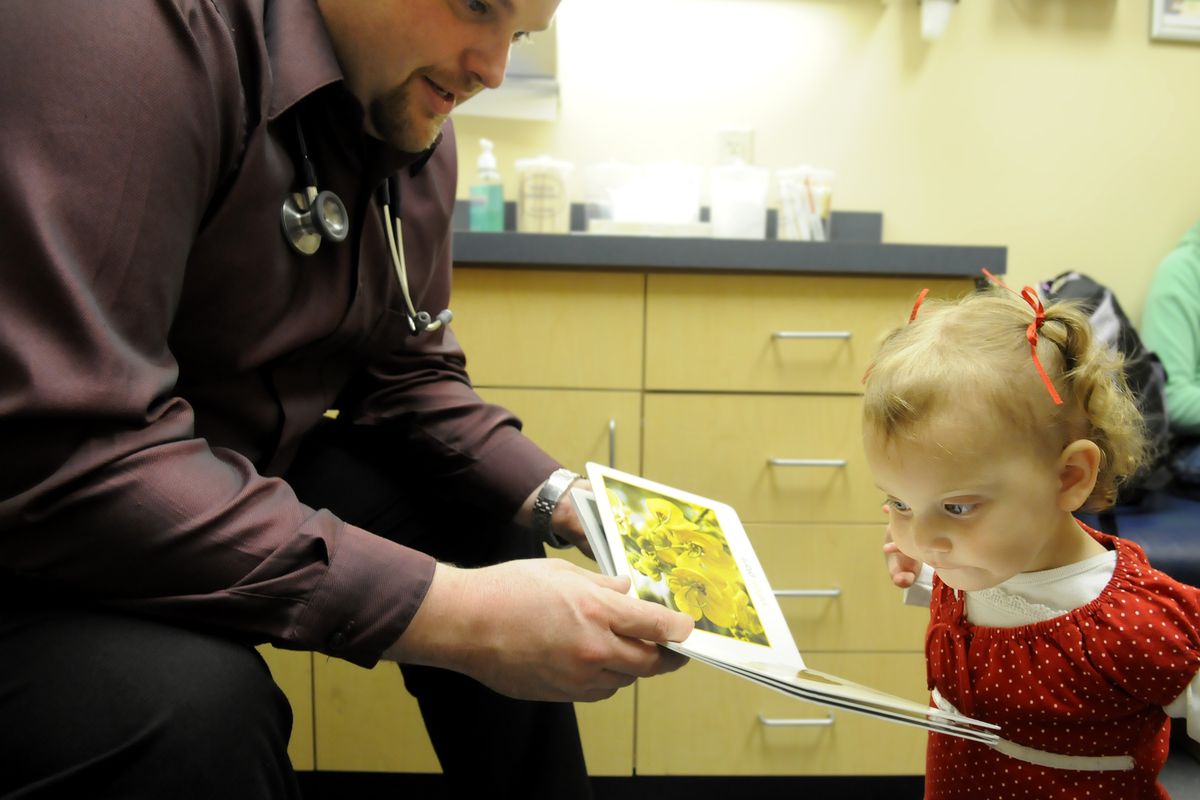Deer Park doctor provides prescription for literacy

Children who visit Dr. Daniel Moorman for their wellness check-ups get more than the routine physical exam. They also receive a brand new book, plus the experience of being read to by their own pediatrician.
Moorman, who works at Community Health Association of Spokane’s North County Clinic, begins every check-up by sitting down with each child and reading “No, David,” “Peek-A-Boo with Clifford” and other children’s books aloud.
Reading together has been a nightly routine for Moorman and his son, 19-month-old Ryan, from the time he was a newborn.
Now, the Deer Park physician wants to help promote early literacy by giving books to kids and showing families the benefits of reading together.
Moorman is one of a half-dozen physicians in the Spokane area who have joined Reach Out and Read Washington.
The statewide coalition is part of a national program developed by pediatricians and early childhood educators who wanted to expose children to books at an early age in order to promote strong language skills that will help them succeed in school.
“Parents can get so busy with their jobs and other demands that they sometimes forget to sit down with their kids to read,” Moorman explained. “They need to do this in order to give their children a good foundation for learning.”
By reading to kids in the exam room, Moorman hopes to teach or remind families about the importance of reading together.
He and Alexis Craig, administrator for CHAS’s North County Clinic, also have visited Arcadia and Deer Park elementary schools to read aloud for the first- and second-graders.
According to several studies, more than one-third of children entering kindergarten in the United States lack the basic language skills they need in order to learn how to read.
These kids often do not know how to properly hold a book or understand that print is read from left to right, let alone recognize the shapes and sounds of the letters of the alphabet.
Many of these children who lack early literacy readiness skills also live in poverty.
According to 2007 statistics from the Child Trends DataBank, only 21 percent of poor young children were able to recognize all 26 letters of the alphabet, compared with 35 percent living above the poverty line. Less than half could write their name.
Children who struggle to read are inevitably at a higher risk of dropping out of school. Most of these kids get help and guidance from teachers and other specialists by the time they come to school, but some experts say the interventions have to happen even sooner – during those critical years before kindergarten.
Established in 1989 by pediatricians at Boston Medical Center, Reach Out and Read has given away more than 6 million books to nearly 4 million children nationwide, said Dr. Jill Sells, a pediatrician and director of Reach Out and Read Washington.
According to the Reach Out and Read website, the program has served 67,265 children in Washington state and about 10,200 in Idaho. In Washington, books are available in 11 different languages including Spanish and Russian.
To help pay for the books distributed in Eastern Washington, Reach Out and Read has teamed with the Inland Northwest Alliance for Early Learning, a public-private partnership that aims to create a “sustainable system for early learning that prepares all children for success in school and life.”
Sells said she also hopes to work with Rotary clubs and other organizations willing to invest in literacy and early childhood development.
Reach Out and Read begins at the child’s 6-month checkup and continues through age 5. Many of the doctors who are part of the program serve families in low-income communities.
By reading to the children during the first five minutes or so of each wellness visit, Moorman hopes to model for parents the joys and techniques of reading out loud to their kids.
He also uses the opportunity to bond with the child and to assess his or her development. Moorman pays careful attention to how children reach for books, point to pictures, turn pages or maybe name colors and objects they see on the page.
During the exam, he also gives parents and guardians tips on how to pick age-appropriate books for their children and encourages them to read out loud to them each day.
As a kid, Moorman grew up in a family where both his parents worked and didn’t have a lot of time to spend with him. During his first few years in school, he struggled with reading, he recalled.
Now that he’s a parent, Moorman carves out time every night to read and interact with his own son. The two of them enjoy Margaret Wise Brown’s “Goodnight Moon,” Dr. Seuss books and anything with Curious George.
Sometimes, Ryan wants to wander around the room while his dad reads. Often, he brings a book to Moorman and sits on his lap. Their read-alouds can last as short as five minutes or as long as half an hour, the pediatrician said.
Families with young children are excited about the program, said Craig, a CHAS employee for more than a decade. They enjoy watching their child interact with Moorman and they’re thrilled to bring a new book home, she said.
The clinic in Deer Park plans to distribute about 400 more books through the end of the year.
“This is really about parent-and-child relationships,” said Sells. “Through these books, we’re giving families a tool to help them sit down and relax and bond together while reading a story.”